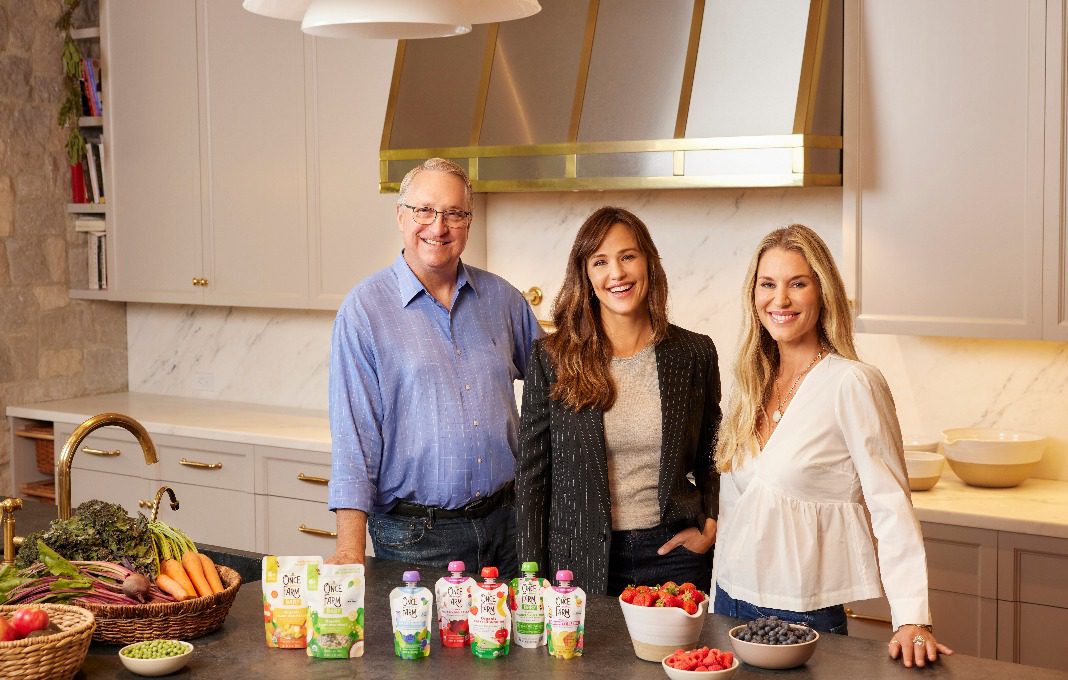A CEO’s Lessons From Scaling Up Once Upon A Farm


Sure, it helps any manufacturer to have an A-list actress not only fronting for your brand but also actually helping run it.
But John Foraker has done a lot more right than teaming with Jennifer Garner in scaling up Once Upon a Farm from a peripheral player in the better-for-you food revolution to a $100-million brand that is elbowing its way around the supermarket with ground-breaking manufacturing, innovative products and aggressive merchandising as well as marketing.
Foraker is on his third successful run as a food-manufacturing pioneer after co-founding Annie’s Homegrown, an early organic processed-food brand; selling Annie’s to General Mills for $820 million in 2014 and helping the CPG giant dimensionalize the brand for three years; and then joining the fledgling baby-food marque Once Upon a Farm in 2017.
“It’s a lot bigger opportunity than I thought coming in,” Foraker said of Once Upon a Farm. “Now that we’ve defined the category and created something new and unique, it’s driving tons of growth.”
While fortuitous factors for the San Francisco-based company have included landing Garner as chief brand officer and leveraging Foraker’s skills and background, Once Upon a Farm originated as a company based on manufacturing innovation, and Foraker has continued to rely on that differentiator.
There were several “better-for-you” baby-food brands that already had transformed the category by the time Cassandra Curtis and Ari Raz established Once Upon a Farm in 2015, but what no one else had done successfully is harness a manufacturing method that has proven the most effective in replicating the production of baby food on a parent’s kitchen stove.
High-pressure processing (HPP) involves putting foods in a high-pressure chamber that is flooded with cold water and pressurized in order to kill pathogens without heat, preserving texture, taste and shelf life with no preservatives, colors or flavors. Raz and Curtis had built a $1-million enterprise with their innovation, but turned to Foraker to scale it up.
“We had to create a category,” Foraker told Chief Executive. “We started with a few stores. When we first went after it, I figured we could get to $20 million or $30 million in revenues, but it was unclear how much higher it could get. But we just crossed $100 million, so it’s a lot bigger opportunity than I thought coming in. Now we’re in 14,000 [stores] and defined a category that is new and unique and is driving tons of growth. Our velocities are really high, and it’s really performing.”
Lately, Foraker has pivoted Once Upon a Farm into another, essentially new category: organic, chilled nutrition bars. A startup called Perfect did some trailblazing in chilled bars, and now Once Upon a Farm is trying to build on the beachhead with its own approach. Foraker is counting on the bars’ clean nutrition profile and lack of added sugar to get the attention of parents who already are attuned to Once Upon a Farm — and whose children are growing out of baby food into this segment.
Here are some things Foraker has learned along the way with Once Upon a Farm:
• Marry innovation with scaling. Just as with its original high-pressure process for pouches, the company developed the new refrigerated bars with manufacturing and scale-up in mind.
“The refrigerated temperature state allows us to do things in the formulation that deliver all that great nutrition and amazing taste and texture” but without some ingredients typically used for ambient-temperature shelf stability that many consumers want to avoid, Foraker recently told FoodNavigator-USA.
• Improve continuously. Foraker has continued to fine-tune manufacturing of the brand’s baby-food pouches even though the company has been making them for several years now. One focus has been making flavors more consistent.
“Our pouch products are extremely hard to make,” he said. “We basically use fresh or instant-quick-frozen fruits and vegetables, and we are sourcing millions and millions of pounds of it from multiple geographies. Early on, there was a lot of variation in the product. So we’ve worked on that continuously and solved that problem.”
• Respond to consumers. Once Upon a Farm customers helped point the brand to early inconsistencies in the product in its pouches. “You could buy a strawberry product one day that would be pale red and then another one the next day, and we got a lot of consumer feedback on that,” Foraker told Chief Executive. “So we worked on the formulations. A lot of that came out of listening to consumers.”
Overall, Foraker said, “We get incredible amounts of inspiration out of social channels and the ability to talk with consumers. We have direct, one-on-one relationships with them, constantly seeking their thoughts on new products. It’s hard to imagine a brand succeeding in the world we live in now without doing those kinds of things, everything moves so fast.”
• Work with retailers. Space is at a premium in supermarkets, and for the most part Once Upon a Farm is merchandised in coolers in the dairy section, as are its new bars. But Foraker is testing the idea of adding coolers to the baby aisle to house the brand, much as some pet-food brands have put coolers in pet stores.
“Our assortment generally turns two to three times faster than everything else in the baby aisle,” justifying retailers’ cooperation in Once Upon a Farm’s test with coolers, Foraker told FoodNavigator-USA.
• Take advantage of superstardom. Garner, a Houston and West Virginia native, has worked her way to Hollywood stardom from her original TV series, Alias, to starring roles in a number of films including Catch Me If You Can, 13 Going on 30, and Dallas Buyers Club. But lately, she’s getting more screen time for starring in Capital One TV advertisements, and recently benefited Once Upon a Farm in a spot that featured both brands.
But Garner also is intimately involved in the food maker’s C-suite. “She’s in all of our leadership meetings for multiple hours, on the board of directors, in hundreds of sales calls,” Foraker said. “She understands and knows the food business, but at the same time, there were a lot of things she’s helped us understand, like the power of marketing and the authenticity she brings. And she always challenges us to think bigger.”


0

1:00 - 5:00 pm
Over 70% of Executives Surveyed Agree: Many Strategic Planning Efforts Lack Systematic Approach Tips for Enhancing Your Strategic Planning Process
Executives expressed frustration with their current strategic planning process. Issues include:
Steve Rutan and Denise Harrison have put together an afternoon workshop that will provide the tools you need to address these concerns. They have worked with hundreds of executives to develop a systematic approach that will enable your team to make better decisions during strategic planning. Steve and Denise will walk you through exercises for prioritizing your lists and steps that will reset and reinvigorate your process. This will be a hands-on workshop that will enable you to think about your business as you use the tools that are being presented. If you are ready for a Strategic Planning tune-up, select this workshop in your registration form. The additional fee of $695 will be added to your total.

2:00 - 5:00 pm
Female leaders face the same issues all leaders do, but they often face additional challenges too. In this peer session, we will facilitate a discussion of best practices and how to overcome common barriers to help women leaders be more effective within and outside their organizations.
Limited space available.

10:30 - 5:00 pm
General’s Retreat at Hermitage Golf Course
Sponsored by UBS
General’s Retreat, built in 1986 with architect Gary Roger Baird, has been voted the “Best Golf Course in Nashville” and is a “must play” when visiting the Nashville, Tennessee area. With the beautiful setting along the Cumberland River, golfers of all capabilities will thoroughly enjoy the golf, scenery and hospitality.
The golf outing fee includes transportation to and from the hotel, greens/cart fees, use of practice facilities, and boxed lunch. The bus will leave the hotel at 10:30 am for a noon shotgun start and return to the hotel after the cocktail reception following the completion of the round.